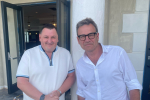MP Bob Seely called his own parliamentary debate on Tuesday (15 June) to set out why the Island should be targeted for more support through the Government’s levelling up agenda.
Mr Seely is championing a joint bid with the Isle of Wight Council that if, successful, would see major investment and new jobs created in East Cowes.
During the debate Mr Seely called on Government departments to work together to assist the Island with a strategic roadmap for the next 50 years – an approach he suggested could be tested here and used elsewhere.
He said: “If there is one critical element that I want to leave with the Minister today, it is that the levelling-up agenda for the Isle of Wight implies many things. That includes not only economic development, important as that is, but training and skills, education, which is critical, health outcomes, greater environmental protection, housing and planning.
“Effectively, we want a strategic road map for the next 50 years that has more to offer the Island than we have had in the past 50 years.”
He added: “The Isle of Wight Council and I, working together, are putting in what we believe is a very strong bid for a development in East Cowes. I am keen that it reaches receptive ears in Government and among Ministers.
“The levelling-up agenda, done right, is one of great hope and potential prosperity for this country. If it is done wrong, we will be letting down millions of people throughout the United Kingdom.”
Making specific reference to the bid submitted this week he said: “The bid going in this week is in relation to a series of buildings in East Cowes that we wish to transform. The purpose is to grow the number of high-paid jobs in marine, but also in the tidal, wind and offshore renewable sectors. Our bid will enable us to develop that cluster of excellence further and ensure that East Cowes continues to grow as a shipbuilding composite and green tech hub for the United Kingdom as a whole.
“Our regeneration approach, especially after covid, will be focused primarily on Newport. The town centre has a lot of empty shops and Newport harbour is ripe for development as a regeneration hub. As part of that, we want high-quality new house building for Islanders in sensitive numbers to drive regeneration. We need to bring back young people and housing into the town centre to drive economic growth and to provide employment, for start-up companies, for leisure and for higher education facilities, which I will come to. We need space for start-ups and, potentially, a new railway station, depending on how the rejuvenation of the branch-line project goes. If there was a single long-term item that I would interest the Minister in after the East Cowes project, it would be the regeneration of Newport to drive the Island’s economy.”
Mr Seely has also written to the Government this week in support of the bid. In his letter, he said: “The East Cowes Marine hub scheme has been chosen because first, it is important in its own right, and second, it is time-sensitive and projects must be deliverable within a time frame, so planning permission must have already been sought. I thank Council officers for their valuable work in this regard.
“We see our levelling up agenda encompassing not only economic but also social and environmental regeneration. We see the Island’s regeneration/levelling up projects as bringing together many different strands of development in a unified and coherent way.
“I reiterate; our plans for the Island are to provide vision and leadership. We seek progress not only in economic terms, but also in social and environmental terms. We need to build housing for Islanders, on brownfield sites, in sensitive numbers, whilst protecting our natural world both for generations to come but also for our visitor economy. We welcome and thank Government for recognising, for the first time, the additional costs of providing public services on an Island but believe that that must include health and well as local Government. We seek greater investment in our young people, by providing not only better education but greater provision in higher education, working with the excellent work done by the IW College. In transport and planning, we seek attractive alternatives to car travel and a long-term improvement to cross-Solent connectivity.”
Copyright 2025 Bob Seely representing the Isle of Wight. All rights reserved.
Powered by Bluetree




